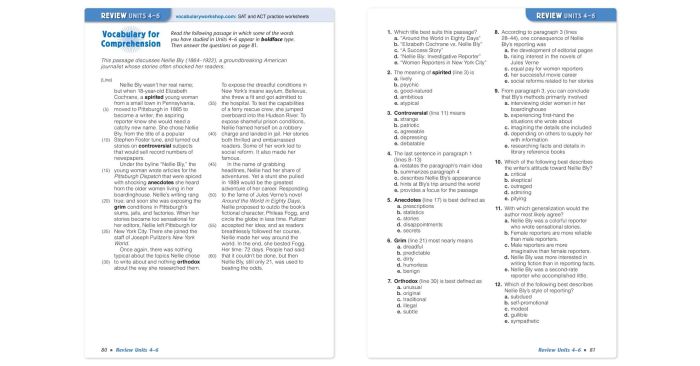Welcome to Vocabulary Workshop Level B Unit 11, a comprehensive resource designed to elevate your vocabulary skills. This unit delves into a curated list of vocabulary words, providing clear definitions, exploring their usage, and offering engaging activities to reinforce learning.
Through interactive exercises, puzzles, and real-world applications, Vocabulary Workshop Level B Unit 11 empowers learners to expand their vocabulary, master different parts of speech, and apply their knowledge effectively in various contexts.
Vocabulary Overview
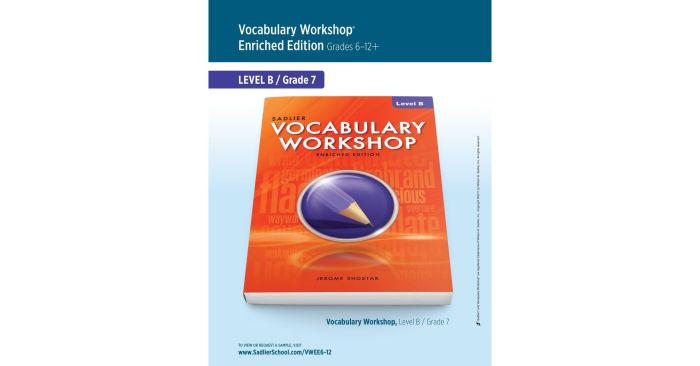
Unit 11 of Vocabulary Workshop Level B introduces students to a range of new vocabulary words that are essential for expanding their vocabulary and improving their communication skills.
Word List, Vocabulary workshop level b unit 11
The following is a comprehensive list of the vocabulary words included in Unit 11:
- Acquire(verb): to gain possession of something
- Appreciate(verb): to understand and enjoy the value or beauty of something
- Astonish(verb): to surprise greatly
- Bewilder(verb): to confuse or perplex
- Candid(adjective): honest and straightforward
- Deceive(verb): to mislead or trick someone
- Deter(verb): to prevent or discourage someone from doing something
- Elegant(adjective): graceful and stylish
- Enthusiastic(adjective): full of energy and excitement
- Fervent(adjective): intense and passionate
- Fluctuate(verb): to change or vary irregularly
- Genuine(adjective): real or authentic
- Humility(noun): the quality of being modest and humble
- Impeccable(adjective): faultless or perfect
- Indispensable(adjective): essential or necessary
- Ingenuity(noun): cleverness and creativity
- Magnificent(adjective): grand and impressive
- Modest(adjective): humble and unassuming
- Persevere(verb): to continue doing something despite difficulties
- Pristine(adjective): clean and unspoiled
- Proficient(adjective): skilled or competent
- Respected(adjective): admired and honored
- Serene(adjective): peaceful and calm
- Sophisticated(adjective): refined and cultured
- Subtle(adjective): difficult to notice or understand
- Triumphant(adjective): victorious or successful
- Versatile(adjective): able to do or be many different things
- Vivid(adjective): bright and intense
li> Distinguish(verb): to recognize or emphasize the difference between two or more things
Usage Examples
These vocabulary words can be used in a variety of contexts. Here are some examples:
- I acquireda new skill by taking a class.
- I appreciatethe beauty of nature.
- The news astonishedme.
- The instructions bewilderedme.
- She was candidwith me about her feelings.
- He tried to deceiveme, but I saw through his lies.
- The weather conditions deterredus from going outside.
- It is important to distinguishbetween right and wrong.
- The party was elegantand sophisticated.
- She was enthusiasticabout her new job.
- He was ferventin his beliefs.
- The stock market fluctuatedwildly.
- The painting was genuineand not a fake.
- He showed great humilityin accepting the award.
- Her work was impeccable.
- This tool is indispensablefor my work.
- She had great ingenuityin solving the problem.
- The sunset was magnificent.
- He was a modestman.
- She perseveredthrough the difficult times.
- The lake was pristineand clear.
- He was a proficientpianist.
- He was a respectedmember of the community.
- The music was sereneand calming.
- She was sophisticatedand well-educated.
- The change was subtle, but I noticed it.
- He was triumphantin his victory.
- She was a versatileactress who could play a wide range of roles.
- The colors were vividand eye-catching.
Vocabulary Practice Activities
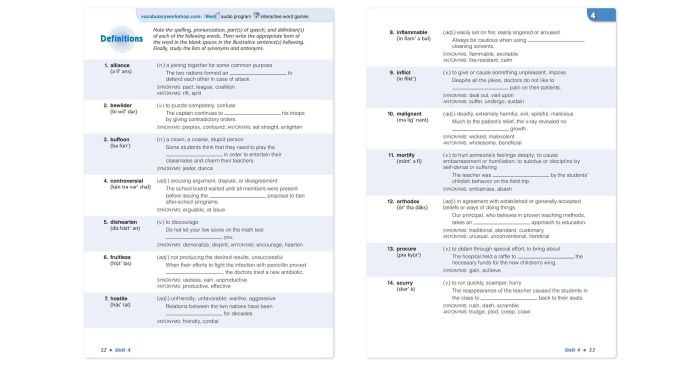
Engaging vocabulary practice activities are crucial for reinforcing learning and promoting active engagement with new words. These activities provide opportunities for students to apply their vocabulary knowledge in diverse contexts, fostering a deeper understanding and long-term retention.
To design effective vocabulary practice activities, consider the following:
Interactive Games
- Word Charades:Students act out a vocabulary word while others guess its meaning.
- Vocabulary Bingo:Create bingo cards with vocabulary words and have students listen to or read sentences containing the words.
- Crossword Puzzles:Design crossword puzzles that require students to use vocabulary words to complete the grid.
Puzzles and Quizzes
- Word Searches:Create word searches that contain vocabulary words for students to find.
- Multiple Choice Quizzes:Prepare quizzes with multiple-choice questions that test students’ understanding of vocabulary words.
- Matching Exercises:Have students match vocabulary words with their definitions or synonyms.
Contextual Applications
- Sentence Completion:Provide students with sentences containing blanks and have them fill in the blanks with appropriate vocabulary words.
- Storytelling:Encourage students to create stories or dialogues that incorporate the vocabulary words.
- Role-Playing:Design role-playing scenarios that require students to use vocabulary words in realistic situations.
Vocabulary Building Strategies
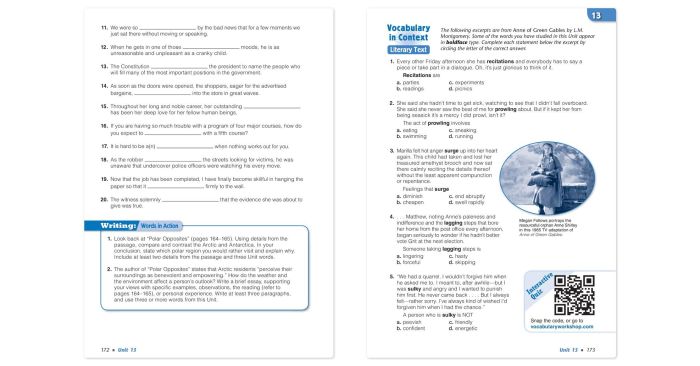
Expanding vocabulary is essential for effective communication and comprehension. Various strategies can be employed to enrich one’s vocabulary, including root word analysis, context clues, and flashcards.
Root word analysis involves identifying the origin and meaning of words by breaking them down into their constituent parts, such as prefixes, suffixes, and roots. This technique helps in understanding the relationships between words and their meanings.
Context Clues
Context clues are hints within a text that provide clues to the meaning of unfamiliar words. These clues can be in the form of synonyms, antonyms, definitions, or examples. By paying attention to context, readers can infer the meaning of unfamiliar words without relying on a dictionary.
Flashcards
Flashcards are a simple yet effective tool for memorizing vocabulary. They consist of cards with the word on one side and its definition or synonym on the other. Regular review of flashcards helps in retaining new words and reinforcing their meanings.
Incorporating vocabulary building into daily routines is crucial for sustained improvement. Reading widely, engaging in conversations, and using online resources can provide ample opportunities to encounter new words and expand vocabulary.
Vocabulary Assessment

Evaluating students’ vocabulary comprehension is crucial to monitor their progress and identify areas for improvement. Multiple methods can be employed to assess vocabulary effectively.
One common method is through written tests. These tests can include multiple-choice questions, where students select the correct meaning or definition of a word from a given list. Fill-in-the-blank questions require students to complete sentences or paragraphs using appropriate vocabulary words.
Essay questions can also be used to assess students’ understanding of vocabulary in context.
Rubrics for Evaluation
To ensure consistent and objective assessment, it is essential to develop rubrics for evaluating student responses. Rubrics provide clear criteria and expectations for each question or task. They can include:
- Accuracy:The extent to which students provide correct definitions or use words appropriately.
- Comprehension:The depth of understanding students demonstrate in their responses.
- Usage:The ability of students to use vocabulary words in a meaningful and contextually appropriate manner.
Providing Feedback and Tracking Progress
Providing meaningful feedback to students is crucial for their progress. Feedback should be specific, constructive, and actionable. It should highlight strengths, identify areas for improvement, and suggest strategies for enhancing vocabulary comprehension.
Tracking student progress over time is also important. This can be done through regular assessments and by maintaining a record of student responses. By monitoring progress, teachers can adjust their instruction and provide targeted support to students who need it.
Vocabulary Integration
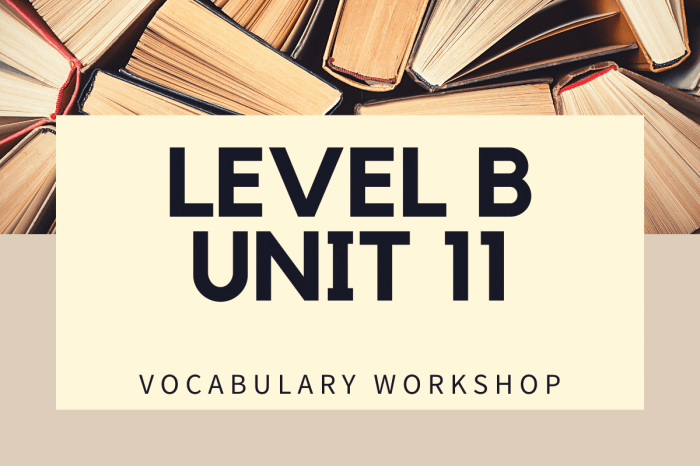
Integrating vocabulary into other subject areas is crucial for fostering deep understanding and enhancing overall language proficiency. By connecting vocabulary to diverse content, learners can explore new words in meaningful contexts and strengthen their comprehension skills.Cross-curricular activities offer valuable opportunities for vocabulary integration.
For instance, in science, students can investigate the vocabulary of ecosystems, while in math, they can explore the vocabulary of geometry. Similarly, in social studies, students can delve into the vocabulary of historical events.The benefits of interdisciplinary vocabulary are multifaceted.
It promotes interdisciplinary connections, helping students understand the interconnectedness of different subject areas. It also enriches vocabulary development, exposing learners to a wider range of words and their applications. Furthermore, it fosters critical thinking skills, as students must analyze and apply vocabulary in various contexts.
Question Bank: Vocabulary Workshop Level B Unit 11
What is the purpose of Vocabulary Workshop Level B Unit 11?
Vocabulary Workshop Level B Unit 11 aims to enhance vocabulary skills through a comprehensive approach that includes word exploration, practice activities, and effective strategies.
What types of activities are included in Vocabulary Workshop Level B Unit 11?
Vocabulary Workshop Level B Unit 11 features engaging exercises, interactive games, puzzles, and quizzes to reinforce vocabulary learning and application.
How can I integrate vocabulary learning into my daily routine?
Vocabulary Workshop Level B Unit 11 provides tips and techniques for incorporating vocabulary building into daily routines, such as root word analysis, context clues, and flashcards.
